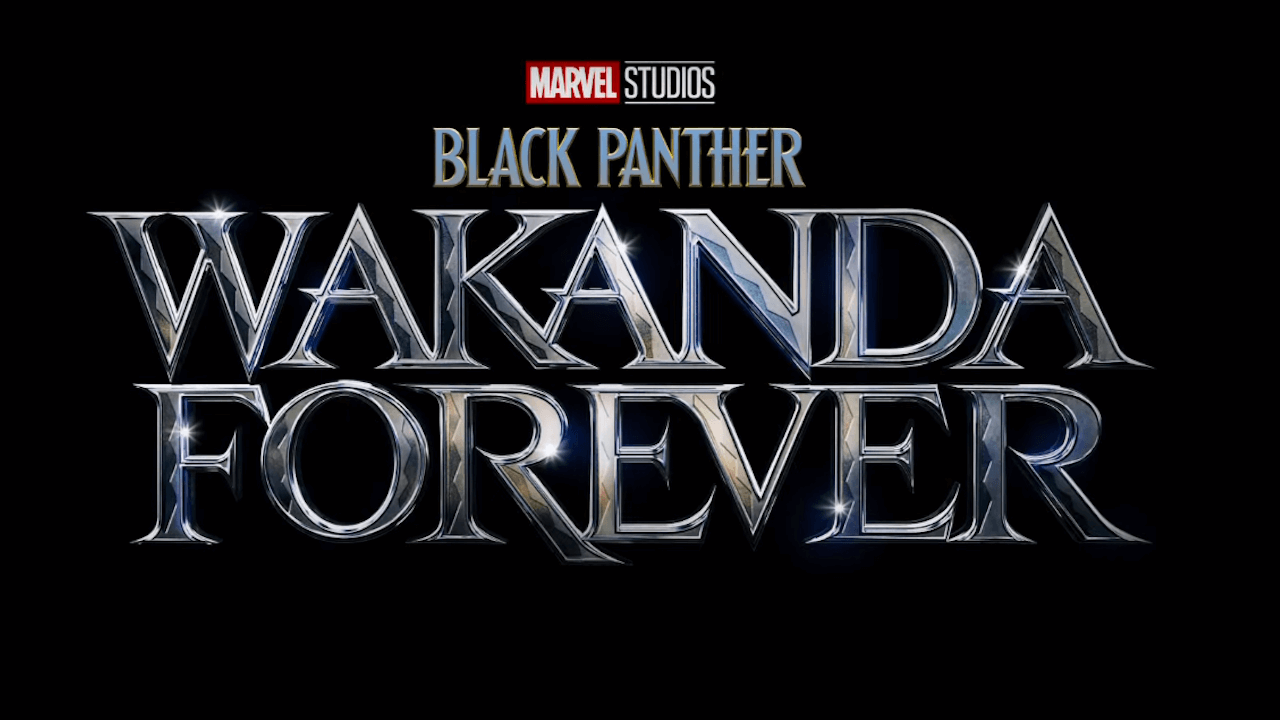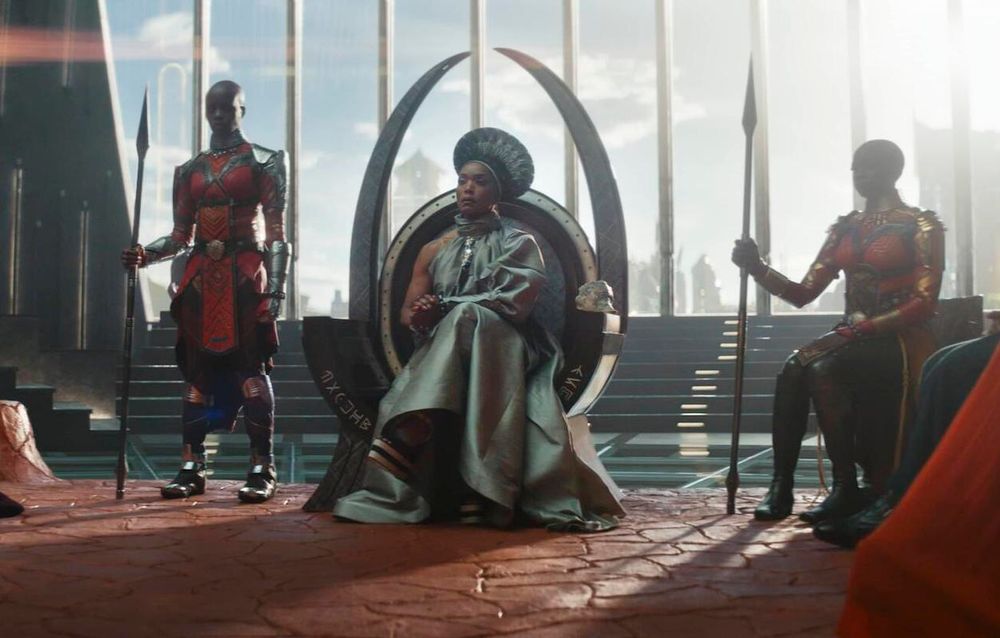Ryan Coogler had an impossible task: Make a Black Panther sequel that performs as well as its predecessor without the gravitas and presence of its extremely popular leading man. I’ve been trying to make a comparison to what that level of pressure might be like in my work life. As a librarian, it’d be like if I went to work one day and all of the thousands upon thousands of books in the building were thrown onto the floor in every corner, and then I shelved all of them, in order, in a single hour. And then suddenly, an earthquake knocked all the books off the shelves again. This time, the expectation would be to reshelve them once again—in 30 minutes. That first shelving is stunting, but that second shelving is all pressure. And, for the record, impossible.
For Coogler, Wakanda Forever isn’t just about cinematic execution. Ever since Chadwick Boseman passed away in 2020, whatever film came after Black Panther was going to have to do something no other Marvel film was required to do: It was going to have to answer to Black people.
On that front, Wakanda Forever does its day job. It delivers a superhero film that fits into a universe of franchises and injects enough action beats to justify the popcorn tub. The movie is smart in that it doesn’t try to be the first movie. It takes the ingredients it needs to tell a different story (while stuffing in all of the mandatory crossover baggage that comes with every Marvel property these days) and keeps it moving. In an ideal world, the first Black Panther would’ve happened, and the filmmakers would’ve been free to tell any story they wanted after that. With Boseman’s death, Coogler essentially had to reinvent the franchise again to set us up for a world in which this universe can fulfill its storytelling potential. So it’s not an all-out brawl, nor is it a war movie, nor an origin story, but it is. It spends no small amount of time being a political thriller and a spy film. Somewhere in there, someone throws a helicopter into the ocean with their bare hands to keep things in the superhero pocket.
But it’s also a film charged with extra, unavoidable social duties. It has to be a memorial, a torch passing, a balm, and Black as hell. That’s a lot to ask of a movie, even one with an audience as thirsty for representation as Black folks. We still have people clinging on to Kanye West for guidance, so you’d think the bar would be low, but that’s not how Coogler operates. He only takes the swings he knows he can knock out the park, and gives us the kind of work that makes us level up a little to see all of its angles.
Maybe Coogler was too quiet about his process, too in-the-zone getting us here. People were out here saying wild things after Boseman died, and again after the first Wakanda trailer dropped. Where were all the men? Is this emasculating Black men? Did we take the “RecastTChalla” call too far? And who the heck is in that new Black Panther suit?
I love that this film exists, with its heaping servings of Black women being amazing, dropping enemies, cracking codes, and generally running a nation state. I want to line up every dude that was claiming such a film emasculated Black men and kick them in the groin.
I don’t know when folks stopped trusting Ryan Coogler. A lot of the banter treated the writer/director like he didn’t know what he was doing, when he is the one person perfectly positioned to determine the next move for the franchise. It’s easy to forget the fallow years before the first Panther film, how much teeth-sucking folks were doing before the first trailer dropped. We thought that if a Black Panther movie ever got made, it would look like the cheapest Marvel film of all time. We thought Boseman wasn’t buff enough. We thought it would make Africa look like it does in every other Hollywood film, primitive and dark.
Coogler fixed all of that and more. Gave us a movie worth dressing up to see. Crafted a world of pride and color and strength that made other Marvel properties kiss the ring. And for his trouble, Coogler made one of the highest-grossing movies of all-time (currently #14, down from a peak #9). It’s still the highest-grossing film by a Black director ever. Perhaps the most important factor of all was that he was Chadwick Boseman’s friend. Almost no one weighing in on the future of Black Panther could make that claim. We didn’t have a choice but to let the man cook. And thank god, because Wakanda Forever is everything it needs to be, and everything we need it to be.
I was once told that in a debate, I should consider that whoever is on the other side of the table at least believes they’re helping the same cause that I am. I find that advice hard to implement when the other side of the table thinks a major motion picture loaded with Black women being awesome is somehow a threat. I get it when white supremacists say it, but it makes no sense when Black men say it. I love that this film exists, with its heaping servings of Black women being amazing, dropping enemies, cracking codes, and generally running a nation state. I want to line up every dude that was on the internet claiming such a film emasculated Black men and kick them in the groin. I wish I would boycott a film that loves me as much as Wakanda Forever loves me. I wish I would boycott a movie with so many Black women stomping a mudhole in colorism. I wish I would look someone in the eye a year from now and say I didn’t contribute to the Blackest movie of 2022. I wish I would tell someone I skipped Chadwick Boseman’s funeral, which is what a lot of Wakanda Forever is. It is service and hymn and repast. It is, as T’Challa’s family does in the movie, a burning of the funeral garment to move from mourning to fruitful remembrance.
Okay fine: The movie is flawed. It has plot holes big enough to fly a Wakandan hovercraft through. The film is burdened with having to tie in other Marvel properties on the horizon. It has entire side quests and character introductions that could have been rolled into existing roles and trimmed the film’s 161 minute running time by a smooth half hour. I love Martin Freeman as much as the next Sherlock fan, but his character could have been cut and we would’ve essentially been done with white folks in this movie in the first 10 minutes. Toni Morrison would have been proud at such an eschewing of the white gaze.
But none of those blemishes derail the film’s real mission, which is love. This film loves people and Blackness and fellowship and the notion of respect. It loves peace; even when it metes out violence, we recognize it as the wrong decision throughout, not the answer. It loves women and intellect and all forms of strength. It loves wisdom and listening. It is the first superhero movie that has ever convinced me that it knows exactly what all of the fighting is for.


